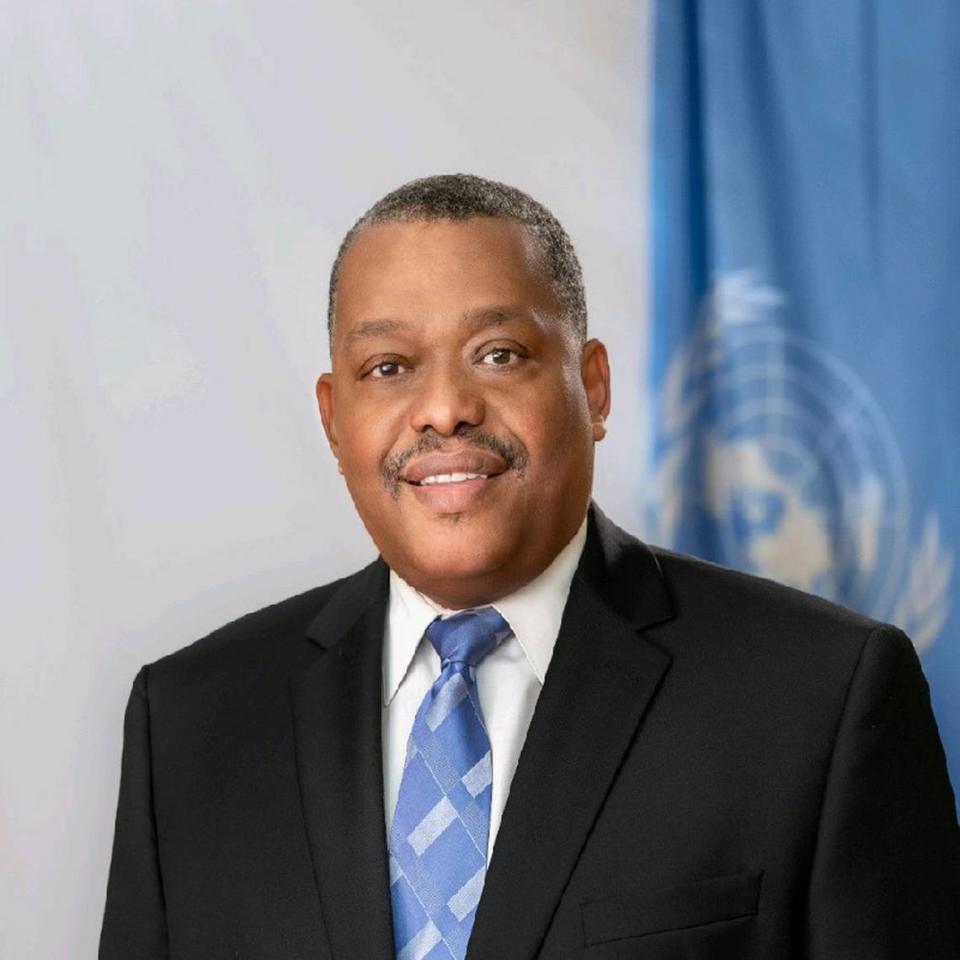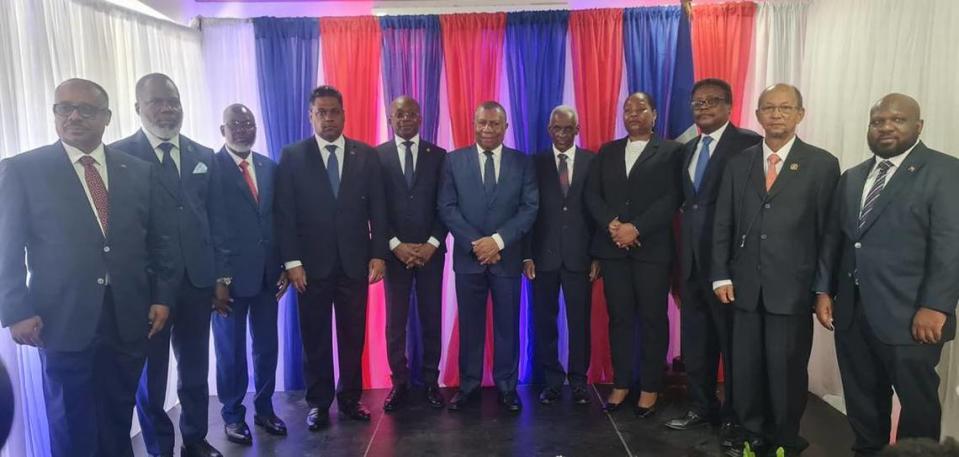UN expert, former prime minister is named to lead Haiti’s transitional government
A longtime United Nations development expert who once served as a top aide to former President Bill Clinton after Haiti’s devastating 2010 earthquake has been selected as the country’s next prime minister.
This will be Garry Conille’s second crack at Haiti’s top government job. He was voted into the job in late 2011 by Haiti’s parliament after five months of political gridlock. But following tensions with the president at the time, Michel Martelly, Conille was forced to resign.
Following his departure from Haiti’s messy politics, Conille, a Haiti-trained gynecologist, went to work as senior advisor to Liberian President Ellen Johnson Sirleaf in her role as co-chair of a U.N. panel on development. In January 2023 he was appointed UNICEF regional director for Latin America and the Caribbean, based in Panama.
This time it wasn’t a parliament that selected Conille — Haiti hasn’t had a functioning one since 2020 — but rather a presidential council that chose him over four other candidates, including a former minister of interior who saw Haiti through some of its most devastating disasters and a former chamber of commerce president who had promised innovation.
Six of the council’s seven voting members supported Conille, 58, who also has experience in humanitarian assistance and conducted his interview via video conference because he is currently out of Haiti. The seventh council membrer, Laurent Saint Cyr, who represents the business community, is currently traveling outside of the country.
The naming of Conille comes more than a month after the council’s own April 25 swearing-in and amid criticism that members lacked a sense of urgency to appoint a new head of government and cabinet to help deal with the deadly gang violence that has millions living in fear, and a looming humanitarian catastrophe.
“The council has a leadership problem,” said Pierre Esperance, a human rights advocate in Port-au-Prince. “Council members are battling for power, they are battling for visibility but they are not interested in the country’s problems.”
Those problems include a surge in violence by armed gang members who on Monday set an armored police vehicle on fire, injuring a police officer. Since Feb. 29 gangs have targeted police stations, vandalized and burned dozens of hospitals, schools and critical infrastructure to try to topple the government.
The U.N. says the violence has forced at least 90,000 Haitians to seek refuge in school yards and public plazas in the capital since the beginning of the year and led to the deaths and injuries of more than 2,500 people.
Despite that dire reality, the new presidential council has gotten off to a rocky start, and had been under pressure to act swiftly in putting a new transitional government in place.
“It is having a hard time moving forward and sending the right signal to the population and the international community,” said Jerry Tardieu, the founder of the political party En Avant. “Skepticism and mistrust are settling in.”
Tardieu is among the leaders who was involved in behind-the-scenes negotiations for a new transitional government in Haiti before armed groups launched their united front while Ariel Henry, the prime minister at the time, was in Kenya finalizing an agreement for an international force to help Haiti. Tardieu said “it is worrisome to realize that the council is entangled and bogged down in its initial” tasks.
Over the weekend the council had published an order extending the term of Michel Patrick Boisvert, Haiti’s finance minister, as interim prime minister for a month. Late Monday, council members shared what appeared to be the long-awaited rules under which the seven voting members and two observers will govern themselves. However, several people who saw the document said no one has seen the actual text.
Soon after, word leaked that they had chosen Conille, who along with the other finalists had been invited to interview with the council for an hour. Now, the next task will be to form a cabinet, a process that will be closely watched.
Tardieu said the council has several problems: a communication strategy in which individual members often express divergent views about how to fight the gangs; a lack of transparency over its selection process to appoint a new prime minister, and its fragile legitimacy. Despite giving themselves a 30-day deadline, none of the members has produced the necessary documents showing that they each meet the legal requirements to sit on the panel, noted Esperance, who heads the Human Rights Defense Network.
Haitian solution or political one?
The political deal that created the transitional council was agreed to on March 11, during a gathering of Caribbean leaders in Kingston, Jamaica. They were aided by U.S. Secretary of State Antony Blinken, who flew to the island-nation to meet with Haitian leaders, who were forced to meet over video conference because the gang attacks had forced the suspension of all commercial flights in and out of Port-au-Prince.
In agreeing to sit on the council, members agreed to appoint a new prime minister to replace Henry, who was forced to resign by Washington as heavily-armed gangs called for his ouster. Together, the council members would be tasked with forming a new government, and preparing the country for the arrival of a Kenya-led Multinational Security Support mission to help the Haiti National Police take on the gangs. They are also supposed to pave the way for long overdue general elections so that a new president can take office by February 2026, ending the council’s reign.
But in carrying out the first task, selecting a prime minister, the council found itself battling perceptions of corruption and backroom deal-making, and accusations that it had not been transparent.
On Friday, as the selection process got under way, the U.S. Embassy in Port-au-Prince said it looked “forward to a transparent process that gives Haiti a Prime Minister and transitional government selected on the basis of technical merit and impartiality.” Other nations also pushed for transparency.
Initially, the council said the process would be limited to only 15 applicants. But 68 applications were either dropped off or sent to a gmail email address by those jostling for the job. A five-member committee then narrowed the choices down to five individuals, including Conille, who in his U.N. role oversaw 36 countries and territories, representing UNICEF before governments, donors, the private sector and civil society in the region. He has also worked in Jamaica coordinating UNICEF services for the island-nation, The Bahamas, Turks and Caicos and Burundi. Conille began his career with the U.N. in Haiti with the agency’s Population Fund in 1999. After the quake, Conille took on the job as chief of staff to the office of the U.N. Special Envoy for Haiti, President Clinton.
The other four candidates for prime minister were:
▪ Fritz Bélizaire, a former minister of sports whose initial selection as prime minister by four of council members led to the group’s first crisis and backtracking.
▪ Paul Antoine Bien-Aime, a former minister of interior who led Haiti during the second administration of late President René Préval when the country was hit by four back-to-back storms and hurricanes, food riots and a deadly earthquake.
▪ Alix Didier Fils-Aimé, a former president of the Chamber of Commerce and Industry businessman who in 2015 ran unsuccessfully for the Haitian Senate.
▪ Jean Rodolphe Joazile, a lawyer, former captain in the Haitian army, minister of defense and president of the Haitian Senate.
Over the weekend, one of the council members announced that the five finalists would participate in a public debate. But after accusations that council members were ignoring their responsibility candidates were invited to take part in the interviews.
Haitians and foreign diplomats chided council members over the lack of transparency in the selection process, worried about influence peddling and reports that council members may have already divvied up key government ministries and positions among their parties, which are preparing for elections. Also worrying critics: Some candidates with previous government experience were dismissed, while others were not.
“They are placing a lot of doubt on the choice at a time when the country needs a prime minister,” said former Prime Minister Jean Michel Lapin, who served in the administration of late President Jovenel Moïse.
Lapin said while the international community favors “a Haitian solution, unfortunately what they have is a political solution” that similar to ones in years past, did not solve the country’s problems during periods of crises.
“The behavior of the members of the council proves once more that you cannot have a political solution to address the problems in Haiti at this moment,” he said. “You have a group of people who since President Moïse was fighting for power, and they continued to fight for power under Prime Minister Ariel Henry and today, they have power and they don’t even have the capacity to govern.”
“This will end up in a waste of time just like with Prime Minister Henry’s government,” Lapin added. “At the end of the year you will hear them say they are unable to organize elections.”
In an interview with Port-au-Prince radio station Magik 9 on Monday, the head of the Haitian Tet Kale Party, Liné Balthazar, accused council members of improvising and said the public has a right to know the criteria used to select the person tasked with helping Haiti return to democratic elections. The list went from 68 to 23 candidates, then 13 and five, Balthazar said, without explanation on how the cuts were made.




